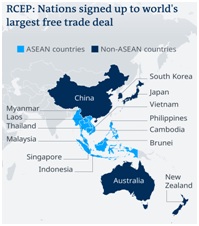Regional Comprehensive Economic Partnership (RCEP)
The RCEP will come into effect on January 1, 2022, marking the formation of the world’s largest free trade zone in terms of trade volume.
Context
The RCEP will come into effect on January 1, 2022, marking the formation of the world’s largest free trade zone in terms of trade volume.
What is RCEP?
- RCEP is a free trade agreement between Asia-Pacific nations of Australia, Brunei, China, Cambodia, Japan, Indonesia, Laos, South Korea, Malaysia, New Zealand, Myanmar, Singapore, Thailand, the Philippines, and Vietnam.
- India and the United States are not members of RCEP.
- The 15-member grouping accounts for 30% of the world’s population and 30% of global GDP (2.2 billion people). Thus, it is the largest trade bloc in history.
- By comparison, the United States-Mexico-Canada trade agreement (USMCA) covers 28% of world trade, while the European Union's Single Market is a distant third at nearly 18%.

- By comparison, the United States-Mexico-Canada trade agreement (USMCA) covers 28% of world trade, while the European Union's Single Market is a distant third at nearly 18%.
Background
|
Why is India not a part of RCEP?
- India did not join RCEP raising a concern that this deal would open it up to Chinese goods, and thus increase its trade balance with China.
Objectives of RCEP
- To lower tariffs, open up trade in services and promote investment to help emerging economies catch up with the rest of the world.
- To help reduce costs and time for companies by allowing them to export a product anywhere within the bloc without meeting separate requirements for each country.
- It also touches on intellectual property, but will not cover environmental protections and labour rights.

